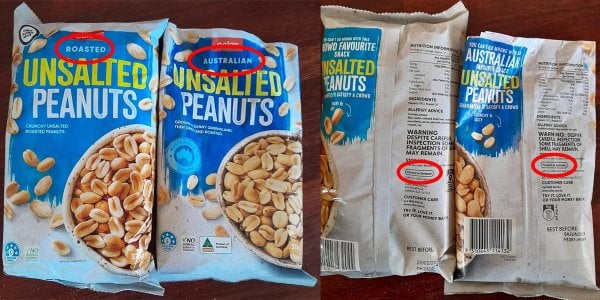Salty surprise: Coles' ‘sneaky’ switch leaves shoppers feeling shell-shocked
- Replies 10
In today's consumer landscape, trust and transparency are paramount considerations for customers. Recent events have underscored the importance of clear communication and honest practices in retail as shoppers become increasingly discerning about the products they purchase.
This sentiment is particularly relevant in the context of changes to popular items or pricing strategies, which can provoke strong reactions from consumers who feel misled or deceived.
Such incidents serve as a reminder of the significance of ethical business practices and their impact on customer loyalty and satisfaction.
Coles, one of Australia's leading supermarket chains, has recently been scrutinised for what many customers call a ‘sneaky’ change to one of their popular products.
The controversy surrounds Coles' own brand of Unsalted Peanuts, which, until recently, proudly bore the label ‘Product of Australia’.
However, a sharp-eyed shopper took to social media to reveal that the nuts are now sourced from Vietnam, sparking a wave of disappointment and calls for a boycott among consumers.
‘Coles—same price, now product of Vietnam,’ the poster wrote.

The change was subtle but significant. The original packaging boasted peanuts ‘Grown in sunny Queensland, then dried and roasted’, resonating with customers looking to support local farmers and industries.
The new packaging, while nearly identical in design, simply states ‘Crunchy unsalted roasted peanuts’, with the back of the bag revealing the words ‘Packed in Vietnam’.
This shift in sourcing left many customers feeling deceived, as the Australian origin was a major selling point for the product.
According to a Coles spokesperson, ‘the change in sourcing was due to improved quality’.
However, numerous users challenged this assertion, contending that the purportedly new variety of peanuts sourced from Vietnam did not meet expectations.
‘I used to buy these Coles peanuts because they had a dark roast flavour that surpassed a lot of other supermarket-sold peanuts, but I noticed they were unavailable recently, and now they’re back. They taste just like every other brand. This must be why,’ one shopper shared.
‘Exactly—the Queensland-grown peanuts were excellent. We are similarly disappointed in our household; they have disappeared,’ another agreed.
A third chimed, ‘I live near Kingaroy. Queensland. Ain’t no way I am eating imported peanuts. Our local industry employs hundreds of people. Buy Kingaroy peanuts people.’
‘This is utterly f*****. I used to go out of my way to go to Coles for these because Woolies only sells ones from China. The fact they’ve been sneaky c**** about the packaging on top only makes it worse,’ someone else remarked.
Many agreed that the slight alteration in packaging was vexing and could be easily overlooked.
‘See now, THIS is a genuine Colesworth complaint. The packaging has been made to deliberately look as close as possible to the Australian product, and it’s not clear either—it just says “packed in” Vietnam”—are the peanuts grown and roasted there? Or are they from somewhere else? We don’t know cos it doesn’t say,’ one commented.
‘Unfortunately, the majority of people don’t read the product, so they have done everything they can to make it look the same. More profit for an inferior product, and people will likely just keep buying them without noticing,’ another responded.
The frustration was compounded by the perceived lack of transparency. The term 'packed in Vietnam' raised questions about the peanuts' true origin and whether they were grown, harvested, and roasted in Vietnam or merely packaged there.
‘These say “packed in” Vietnam, not “product of”. A common way to hide where they’re actually from. Probably think we won’t like the answer,’ a commenter explained.
‘FYI—packed in Vietnam highly likely means Chinese product, but they pack it in Vietnam so they don’t have to declare “Product of China”. Same with frozen vegetables “packed in New Zealand”. It’s a legal strategy that all food companies know about and use when needed,’ another suggested.
‘Go out of your way to buy Australian peanuts for multiple reasons,’ a third added.
‘Peanuts are at risk of aflatoxin which is a fungus that is carcinogenic. Mitigation for this risk is built into the entire Australian supply chain from the farm onwards, and the risk is effectively zero for Australian peanuts.’
‘The two products in your photo are NOT the same thing!’ they continued.
In response to the backlash, a Coles spokesperson stated that the decision to source peanuts from Vietnam was based on several factors.
‘We are proud to offer the largest Own Brand range in Australia across a range of price points, and we are seeing value-conscious customers switching into Own Brand alternatives in a range of categories,’ they said.
‘We assess a variety of factors when sourcing Coles Own Brand Unsalted Peanuts, including shape, level of roast, taste and crunch. The change in sourcing was due to improved quality and is part of our commitment to deliver great quality products to our customers.’
As consumers voice their concerns over perceived changes in product offerings and branding tactics at Coles, it's evident that transparency and trust remain critical in the retail industry.
The recent controversy surrounding alterations to popular items, such as peanuts and fruits, sparked heated discussions online, with shoppers expressing frustration and scepticism.
This growing scrutiny highlights the importance of retailers maintaining clear communication and ethical practices to uphold consumer confidence.
In light of these developments, let's examine another shopper's account of alleged rebranding attempts at Coles and the broader implications for both consumers and retailers.
 Have you noticed this change in Coles' peanuts? Will it affect your shopping habits? Let us know your thoughts in the comments below.
Have you noticed this change in Coles' peanuts? Will it affect your shopping habits? Let us know your thoughts in the comments below.
This sentiment is particularly relevant in the context of changes to popular items or pricing strategies, which can provoke strong reactions from consumers who feel misled or deceived.
Such incidents serve as a reminder of the significance of ethical business practices and their impact on customer loyalty and satisfaction.
Coles, one of Australia's leading supermarket chains, has recently been scrutinised for what many customers call a ‘sneaky’ change to one of their popular products.
The controversy surrounds Coles' own brand of Unsalted Peanuts, which, until recently, proudly bore the label ‘Product of Australia’.
However, a sharp-eyed shopper took to social media to reveal that the nuts are now sourced from Vietnam, sparking a wave of disappointment and calls for a boycott among consumers.
‘Coles—same price, now product of Vietnam,’ the poster wrote.

Customers criticised Coles for changing the label of their own-brand Unsalted Peanuts to ‘packed in Vietnam’ instead of Australia. Credits: Reddit / r/australia
The change was subtle but significant. The original packaging boasted peanuts ‘Grown in sunny Queensland, then dried and roasted’, resonating with customers looking to support local farmers and industries.
The new packaging, while nearly identical in design, simply states ‘Crunchy unsalted roasted peanuts’, with the back of the bag revealing the words ‘Packed in Vietnam’.
This shift in sourcing left many customers feeling deceived, as the Australian origin was a major selling point for the product.
According to a Coles spokesperson, ‘the change in sourcing was due to improved quality’.
However, numerous users challenged this assertion, contending that the purportedly new variety of peanuts sourced from Vietnam did not meet expectations.
‘I used to buy these Coles peanuts because they had a dark roast flavour that surpassed a lot of other supermarket-sold peanuts, but I noticed they were unavailable recently, and now they’re back. They taste just like every other brand. This must be why,’ one shopper shared.
‘Exactly—the Queensland-grown peanuts were excellent. We are similarly disappointed in our household; they have disappeared,’ another agreed.
A third chimed, ‘I live near Kingaroy. Queensland. Ain’t no way I am eating imported peanuts. Our local industry employs hundreds of people. Buy Kingaroy peanuts people.’
‘This is utterly f*****. I used to go out of my way to go to Coles for these because Woolies only sells ones from China. The fact they’ve been sneaky c**** about the packaging on top only makes it worse,’ someone else remarked.
Many agreed that the slight alteration in packaging was vexing and could be easily overlooked.
‘See now, THIS is a genuine Colesworth complaint. The packaging has been made to deliberately look as close as possible to the Australian product, and it’s not clear either—it just says “packed in” Vietnam”—are the peanuts grown and roasted there? Or are they from somewhere else? We don’t know cos it doesn’t say,’ one commented.
‘Unfortunately, the majority of people don’t read the product, so they have done everything they can to make it look the same. More profit for an inferior product, and people will likely just keep buying them without noticing,’ another responded.
The frustration was compounded by the perceived lack of transparency. The term 'packed in Vietnam' raised questions about the peanuts' true origin and whether they were grown, harvested, and roasted in Vietnam or merely packaged there.
‘These say “packed in” Vietnam, not “product of”. A common way to hide where they’re actually from. Probably think we won’t like the answer,’ a commenter explained.
‘FYI—packed in Vietnam highly likely means Chinese product, but they pack it in Vietnam so they don’t have to declare “Product of China”. Same with frozen vegetables “packed in New Zealand”. It’s a legal strategy that all food companies know about and use when needed,’ another suggested.
‘Go out of your way to buy Australian peanuts for multiple reasons,’ a third added.
‘Peanuts are at risk of aflatoxin which is a fungus that is carcinogenic. Mitigation for this risk is built into the entire Australian supply chain from the farm onwards, and the risk is effectively zero for Australian peanuts.’
‘The two products in your photo are NOT the same thing!’ they continued.
In response to the backlash, a Coles spokesperson stated that the decision to source peanuts from Vietnam was based on several factors.
‘We are proud to offer the largest Own Brand range in Australia across a range of price points, and we are seeing value-conscious customers switching into Own Brand alternatives in a range of categories,’ they said.
‘We assess a variety of factors when sourcing Coles Own Brand Unsalted Peanuts, including shape, level of roast, taste and crunch. The change in sourcing was due to improved quality and is part of our commitment to deliver great quality products to our customers.’
As consumers voice their concerns over perceived changes in product offerings and branding tactics at Coles, it's evident that transparency and trust remain critical in the retail industry.
The recent controversy surrounding alterations to popular items, such as peanuts and fruits, sparked heated discussions online, with shoppers expressing frustration and scepticism.
This growing scrutiny highlights the importance of retailers maintaining clear communication and ethical practices to uphold consumer confidence.
In light of these developments, let's examine another shopper's account of alleged rebranding attempts at Coles and the broader implications for both consumers and retailers.
Key Takeaways
- Coles faced criticism from customers over a change to their own brand of Unsalted Peanuts, which are now labelled ‘packed in Vietnam’ instead of Australia.
- Shoppers on social media noted the subtle packaging differences and expressed disappointment in the change of origin, with some questioning the quality of the replacement product.
- Users discussed the potential legal loophole companies utilise by labelling products as 'packed in' a certain country, which may obscure the actual origin of the product's ingredients.
- A Coles spokesperson stated the sourcing change was for improved quality and part of their commitment to deliver great products to customers.







